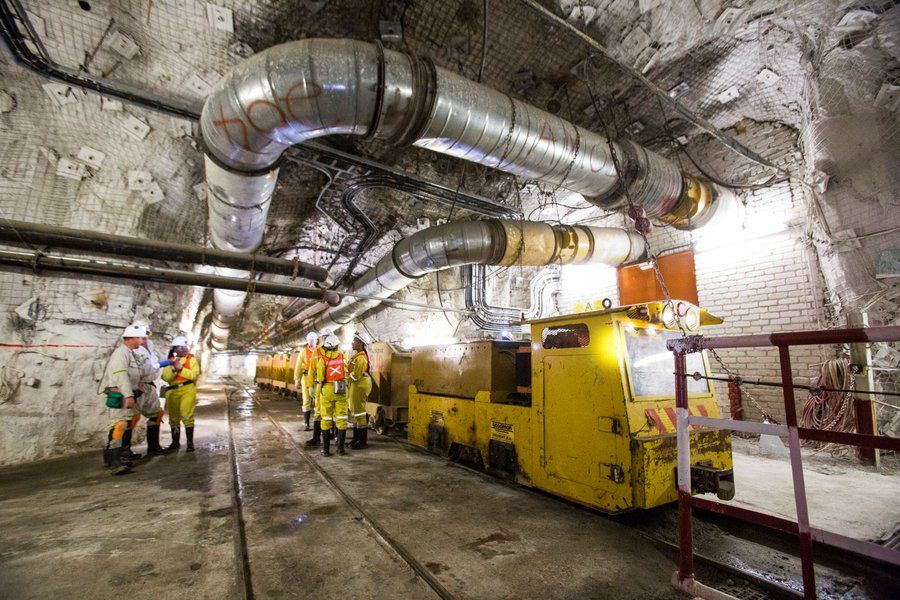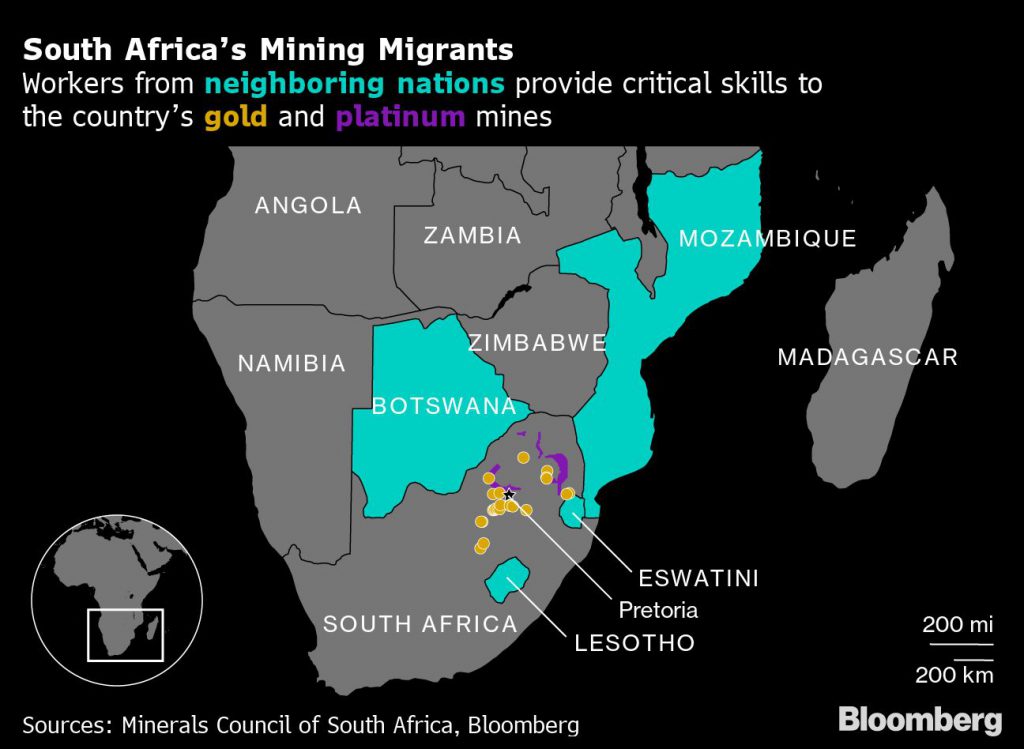
South Africa’s gold and platinum miners are racing to bring back thousands of skilled migrant workers who are crucial to ramping up output following the easing of the nation’s coronavirus lockdown.
For almost 150 years, South Africa’s deep-level mines relied on cheap labor from neighboring Lesotho, Eswatini, Mozambique and Botswana. They still account for about 10% of the industry’s 450,000-strong workforce, and their skills are key to rebooting the nation’s mines.
That’s pushing producers to undertake a huge logistics operation to bus thousands of migrant workers back from their homes, where they sought refuge during the pandemic. After journeys of often more than 500 kilometers (310 miles), those employees will be quarantined for 14 days in hostels and hotels close to the mines.

“You can’t just throw anybody else on the job,” said Stewart Bailey, executive vice president of corporate affairs and investor relations at Johannesburg-based AngloGold Ashanti Ltd., the world’s No. 3 gold miner. “Those are all skilled people, trained and very experienced.”
The stakes are high for South Africa, after the coronavirus piled on economic woes after almost a decade of mismanagement and corruption under former President Jacob Zuma. With the government forecasting the economy to contract as much as 16.1% this year, there’s increasing pressure for a rapid turnaround in mining, one of the nation’s biggest exporters.
The producers have contracted labor consultant TEBA to transport 14,000 foreign workers back to the mines. Buses are carrying half their normal capacity to ensure social distancing, according to Graham Herbert, managing director of TEBA.
“This is probably the biggest movement of labor, certainly in gold and platinum mining, that’s been known”
Graham Herbert, managing director of TEBA
“I have worked in the industry for 30 years and I have not seen anything like this,” Herbert said. “This is a historical first for me. This is probably the biggest movement of labor, certainly in gold and platinum mining, that’s been known.”
Herbert is under pressure to expedite the relocations as skilled labor shortages curb mine output, even after companies were allowed to return operations to full capacity at the beginning of June. The biggest mining companies currently have about 23,000 foreign workers outside South Africa.
Getting all workers back, including those in South African provinces such as the Eastern Cape and KwaZulu-Natal, could take months as travel restrictions and quarantines slow the process, according to Johan Theron, a spokesman for Impala Platinum Holdings Ltd. Foreign migrant workers are key, he said.
“The most skilled and experienced workers are predominantly from those areas and that’s true for the entire industry,” Theron said. “We can’t just return them without putting in place extraordinary measures.”
With the virus outbreak in South Africa yet to peak, those measures include refurbishing old mining hostels to turn them into quarantine facilities. With some workers coming from virus hotspots, companies are also booking them into hotels to meet isolation requirements.
For Sibanye Stillwater Ltd., the biggest platinum producer, bringing back all of its more than 80,000-strong workforce could take until the third quarter, according to spokesman James Wellsted. So far, about half of its employees have returned.
“We may not even get to a point where we get everybody back,” Wellsted said.
Mining companies have asked the government to reopen more border posts with Mozambique and Lesotho to speed the transit of returning workers, said Nikisi Lesufi, an executive for industry lobby group, the Minerals Council of South Africa. So far, only 250,000 of miners are back at work.
“The volumes of workers that are going to come through is such that we want more borders to be opened,” Lesufi said. The disruptions could curb mining output by between 13% and 20% this year, the council said.
While a rally in bullion prices is providing a cushion, the impact of the virus on deep-level gold mines will be particularly “severe,” said Andries Rossouw, an analyst at PwC South Africa. The mining sector contributed 8% of gross domestic product last year.
“Bringing back people over an extended period of time and with limited virus testing capacity, it would be crazy to imagine there won’t be a significant impact on production,” said Theron of Implats.
(By Felix Njini, with assistance from Demetrios Pogkas)
Comments
osvaldo castillo
seria lo ideal inmigrar a estos paiases soy operador certificado en equipos mineros